
 Young carers and parent carers
Young carers and parent carers
Headlines
Young Carers and Young Adult Carers
- Twenty-two per cent suffer significant educational disadvantages (1).
- Carers that progress to Further Education often experience financial hardship as their caring responsibility excludes them from part-time work (1).
- Those that enter the labour market are disadvantaged by poor qualifications or poor school attendance records (1).
- Statistics show an 83% increase in the number of 5 to 7 year olds providing unpaid care and a 55% rise in the number of those aged 8 to 9 years (2).
In Kirklees:
- Carers are more than twice as likely to be bullied as non-carers (3).
- Are 2.4 times more likely to have a disability or Special Educational Needs (SEN) (3) compared with 1.5 times nationally (4).
- When caring for brothers or sisters or other relatives they are 3 times more likely to have an SEN. Where caring for a parent they are 1.4 times more likely to have special educational needs (3).
- Are 1.3 times more likely to be from Black, Asian or Minority Ethnic (BAME) communities. Where caring for a brother or sister they are 1.5 times more likely to be from BAME groups (3) and twice as likely to not speak English as their first language (4).
Parent Carers
- 92% said caring has a negative impact on their mental health, including stress and depression (5).
- 57% report often becoming isolated and losing touch with friends because of their caring responsibilities (5).
- 40% reported that waiting for financial and practical support causes added stress and anxiety (5).
- Parent Carers account for 11% of all carers in Kirklees (6). Caring takes a toll household financial capacity and a carer’s physical and mental health and that of their families.
- Need more support where the child or young person does not meet the criteria for Disabled Children’s Services and / or during the time they are awaiting for a formal assessment (7).
- Would like access to a service which promotes the wellbeing of Parent Carers, offering advocacy, peer support, respite and support when it’s needed (7).
Why is this issue important?
Many carers do not consider themselves to be carers so might not look for support. The cumulative impact of caring can push families into crisis, even though they may not be showing up as a priority group for services. Carers often want to care for their family member but need correct levels of support and respite so they can manage their caring responsibilities and stay healthy themselves. Caring can have a significant impact on day-to-day living where carers miss opportunities non-carers might take for granted.
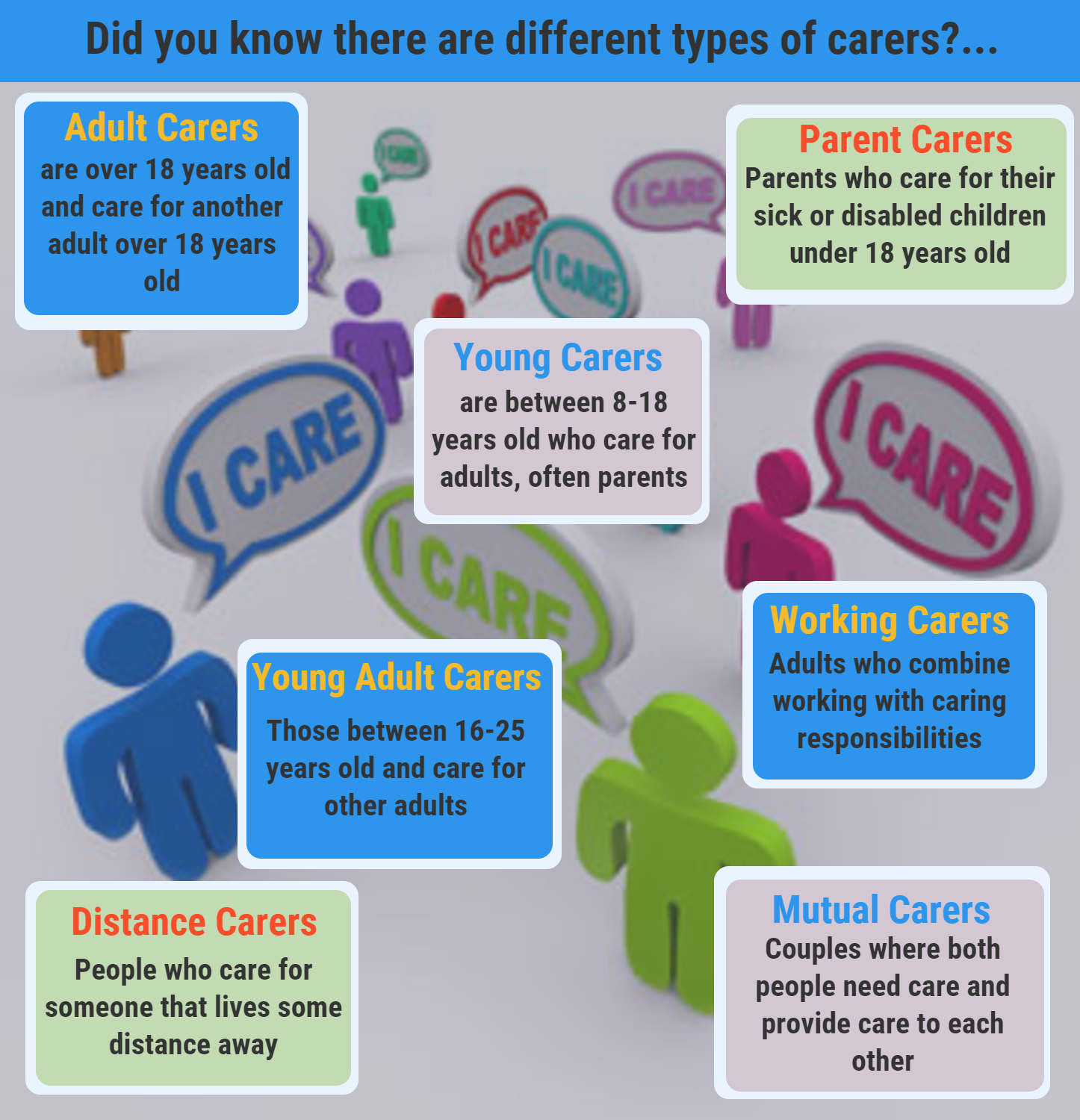
Young Carers and Young Adult Carers provide practical, personal and emotional support. This means caring affects young people in different ways. There is a big difference between helping bathe a disabled sibling compared with what is needed when they are the only support for a lone parent with a severe mental health condition or substance misuse issues. Often they carry out significant caring tasks and assume levels of responsibility usually carried out by adults.
The 2011 national census (2) suggested there were 953 young carers, age 15 or younger in Kirklees; those aged 16 to 18 were excluded from the survey so their numbers are unknown. The Kirklees Young Carers service provides direct support to over 100 young carers a year which suggests that over 800 young people may be hidden carers. This can mean carers and families may not be getting the support needed.
Nationally statistics since 2001 show an 83% increase in the number of 5 to 7 year olds providing unpaid care and a 55% rise in the number of those aged 8 to 9 years (2).
The Office of National Statistics (ONS) (8) estimates the number of disabled children in England to be between 288,000 and 513,000. Applying their research formula to the young people population of Kirklees provides an estimated 2,747 to 4,944 children and young people locally will have some form of disability which will need varying levels of care.
Parent Carers span the geographic localities, ages, gender, ethnicities, social and economic groups of Kirklees. Demographic changes mean more people are taking on caring tasks spending much of their lives providing unpaid support to their child or young person with a disability or additional needs.
Carers UK (5) has estimated that 2.4 million carer’s combine looking after a dependent child under the age of 18 whilst also caring for older or disabled family member. This is described as ‘sandwich caring’ or ‘dual caring’ (9).
The sandwich generation includes those caring for a young adult child who may be studying or working. At the same they are caring for a spouse or ageing, sick or disabled parent(s) who need increasing amounts of care. This description includes grandparents looking after grandchildren whilst supporting other family members at the same time.
This dual role sometimes comes at a cost where carers suffer from ill health, face difficulties to access or stay in the labour market or experience financial hardship. Where they are working carers they are likely to experience higher levels of stress as they try to balance their caring and working responsibilities.
- Only 12% of sandwich carers felt they were juggling everything well, over four in 10 (42%) were struggling to cope or at breaking point (5).
- Over two thirds (69%) said they had seen a negative impact on their ability to afford household bills (5).
- Almost two thirds (63%) said sandwich caring had taken a toll on relationships with their spouse or partner (5).
- A third were caring round the clock and most of these carers (85%) had been forced to give up work to care (5).
- Adult carers are more likely to be lifelong carers where employment opportunities and financial stability is likely to be affected for many years as the young person progresses into adulthood. Caring responsibilities do not simply end because of age. See Adult Carer KJSA link
What significant factors are affecting this issue?
Being a young carer or young adult carer can have positive results. Carers can be self-motivated, multitaskers coping with and achieving at school while undertaking an efficient caring role. Their seeming ability to cope and achieve may disguise their need for support, where they risk becoming vulnerable because the levels of care-giving responsibility are excessive or inappropriate. This risks impacting of their physical or emotional wellbeing, educational achievement and restrict their life chances (10).
Key issues impacting on young carers include:
- Suffer significant educational disadvantages (including bullying, attendance problems or an inability to complete homework or coursework) (1).
- Miss school because of caring responsibilities, most report suffering concentration problems because of late night or early morning caring duties (1).
- One sixth leave school with no GCSEs (1).
Those carers progressing to Further Education often find financial hardship as their caring responsibilities excludes them from part-time work. They are often unable to claim Carers Allowance (1)
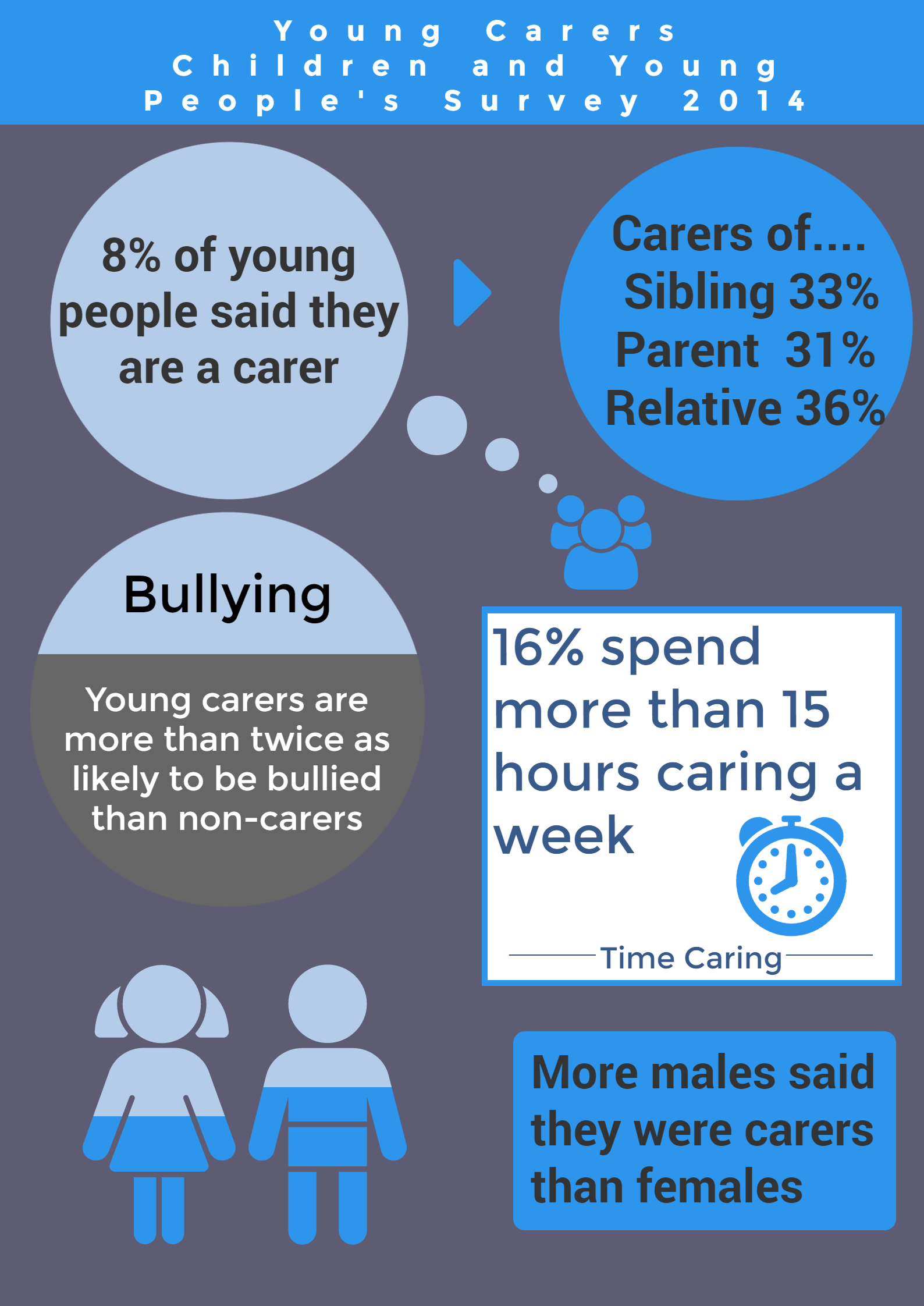
In 2014, Kirklees Council carried out a Children and Young People’s Survey (3) involving 5,343 young people which revealed:
- 8% of students identified themselves as carers of a parent, relative, brother or sister. This caring role involved 54% males and 46% females.
- 16% provide care for more than 2 hours a day with 17% provide care for between 1 to 2 hours a day.
- Students aged 11 to 14 provide the greatest periods of hourly care. The lower rates reported by students aged 16 to 17 may be because of their accepting their roles as being normal, which can result in unmet hidden carer needs.
- Over 31% care for a parent(s) with physical disabilities or illnesses, a further 36% care for other relatives with a disability or illness. 33% care for a brother or sister with a disability or illness.
- Kirklees young carers are more than twice as likely to be bullied as non-carers.
For Parent Carers the pressures of caring can take a toll on a carer’s physical and mental health where their caring responsibilities can continue as the young person progresses into adulthood (5). See Adult Carer and Disability JSA links.
- 92% said caring has a negative impact on their mental health, including stress and depression.
- 57% report often becoming isolated and losing touch with friends because of their caring responsibilities.
- 50% stated that a lack of financial support had had an impact on their physical and mental health.
- 40% reported that waiting for financial and practical support causes extra stress and anxiety.
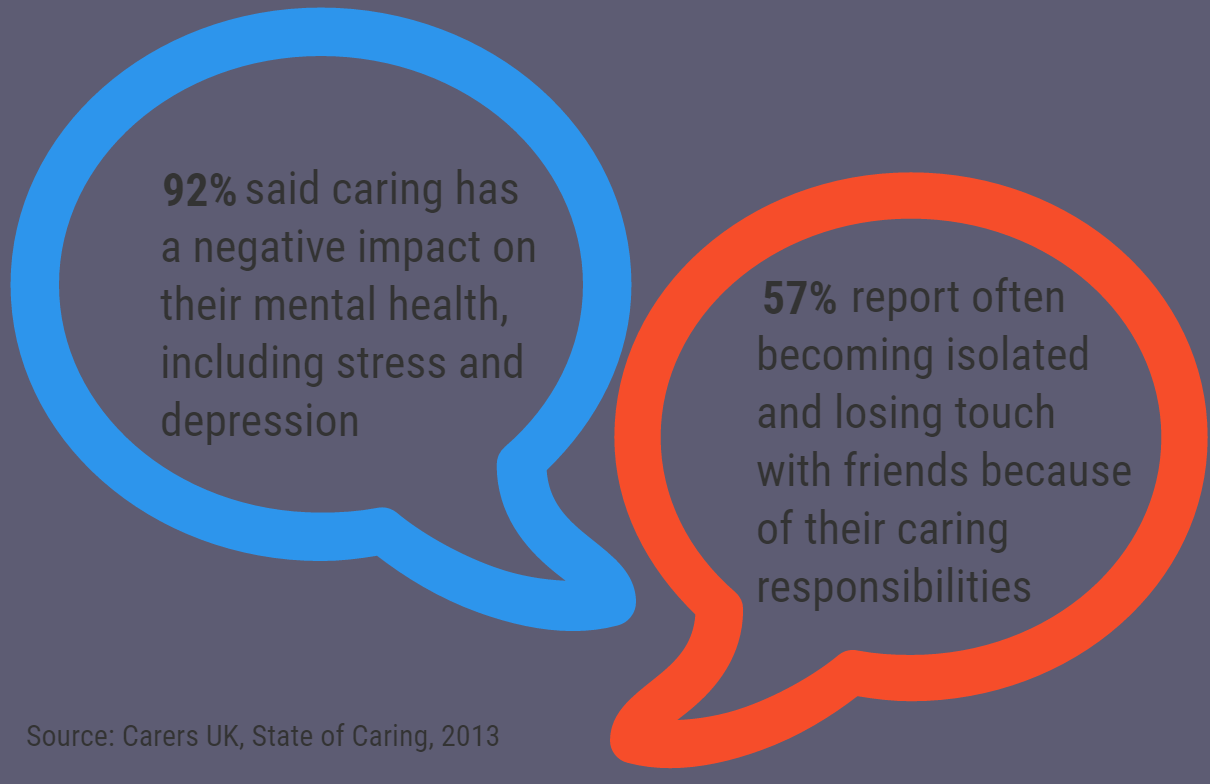
Which groups are affected most by this issue?
Locally young carers in Kirklees are:
- 1.3 times more likely to be from Black, Asian or Minority Ethnic (BAME) communities. Where caring for a brother or sister they are 1.5 times more likely to be from BAME groups (3) and twice as likely to not speak English as their first language (4).
- Those caring for brothers, sisters or other relatives are 3 times more likely to have an SEN (3).
- Are 2.4 times more likely to have a disability or Special Educational Needs (SEN)(3). Compared with 1.5 times nationally (4).
- Where caring for a parent they are 1.4 times more likely to have Special Educational Needs (3).
- Between the ages of 16 and 19, are more likely than the national average not to be in education, employment or training (4).
- The average annual income for families with a young carer is £5,000 less than families who do not have a young carer (4).
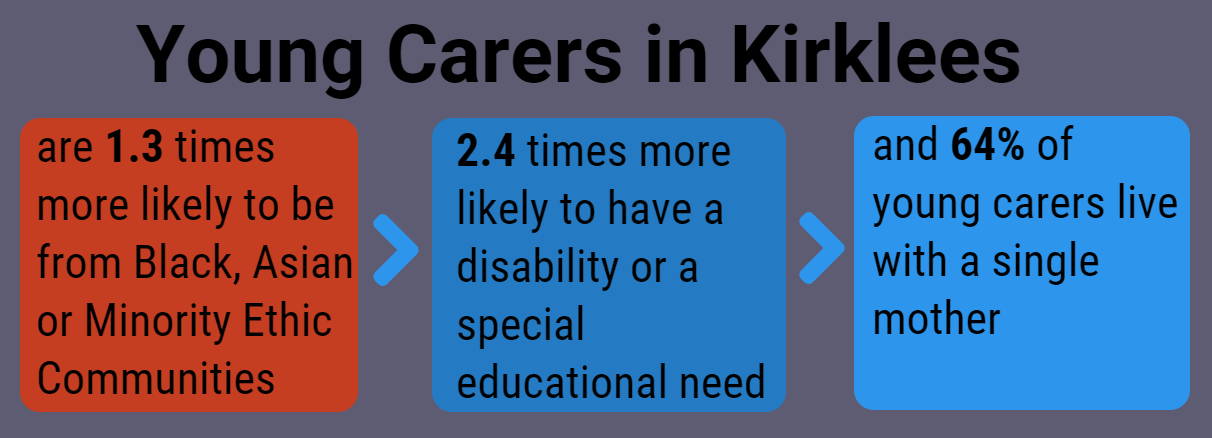
Young adult carers between 14 and 25 years old are in transition. This a time where they face many changes, challenges and opportunities, whether is about leaving school, moving out of home, thinking about higher or further education, or getting a job. Many will be hidden carers, little is known about the personal development barriers they face because of their caring responsibilities.
Parent Carers account for 11% of all carers in Kirklees (6) and identify their most significant issues of affected needs as (7).
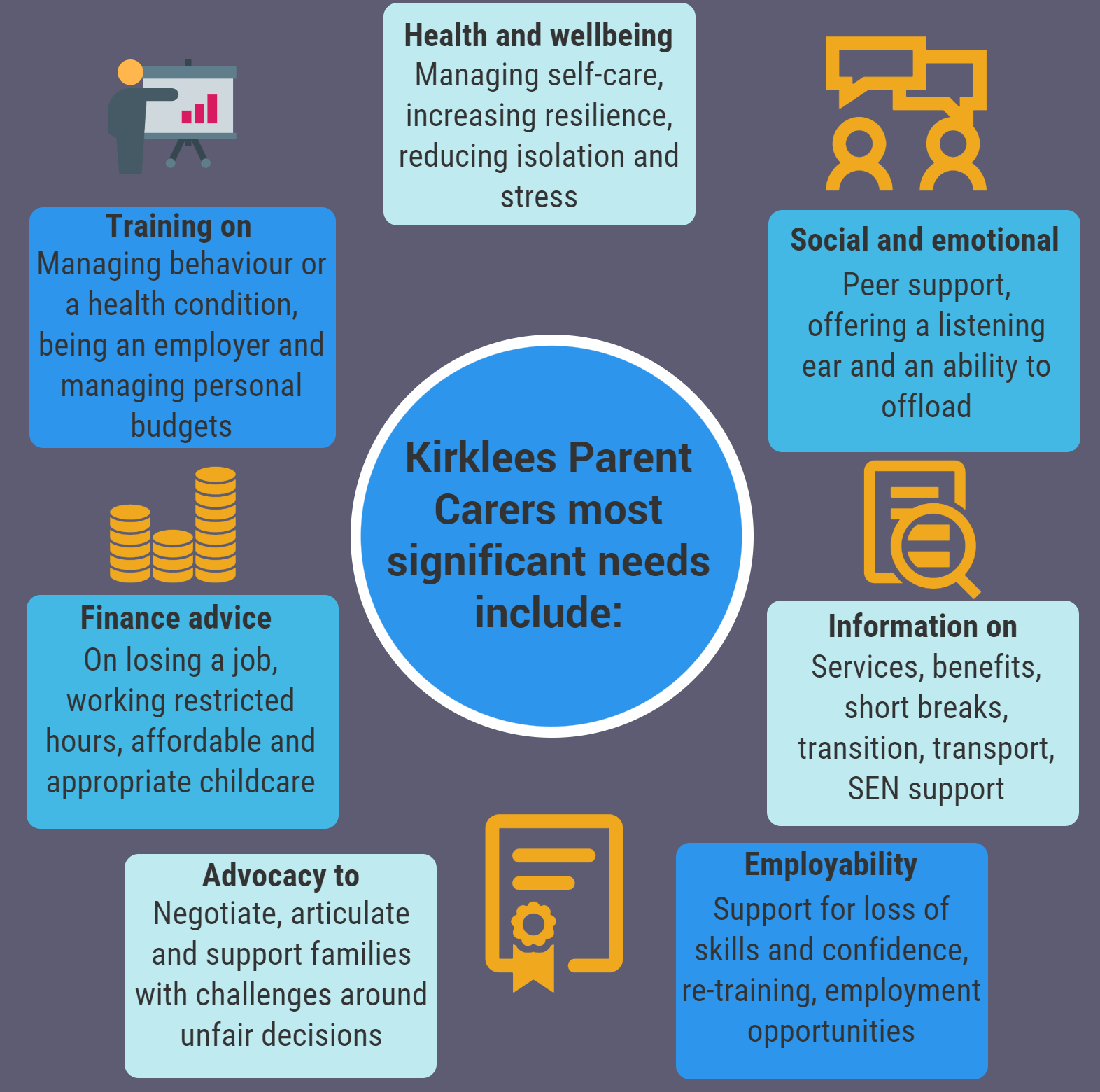
Overseeing and managing the practicalities of caring for somebody can be enormous. This includes engaging with services, managing finances; navigating complex benefits arrangements; sourcing quality care provision; accessing specialist equipment and home adaptations as well as worrying about the person being cared for.
What is this causing greatest concern?
Support services for carers are offered throughout Kirklees. The number of young carers is evenly split between North and South Kirklees. The highest numbers of young carers live within the District Committee areas of Dewsbury and Mirfield (10%), Batley and Spenborough, Huddersfield and Kirklees Rural (7%) (3). Parent Carers are otherwise evenly spread throughout Kirklees District Committees, with an average of 19% across Kirklees (6).
Parent carers can access local services detailed in the assets section of this report or here for the Adult Carer JSA report.
What are the assets around the issue?
Health assets are those things that enhance the ability of individuals, communities and populations to maintain and sustain health and well-being. These include things like skills, capacity, knowledge, networks and connections, the effectiveness of groups and organisations and local physical and economic resources. They also include services or interventions that are already being provided or beginning to emerge which contribute to improved health and wellbeing outcomes.
Assets are hugely important to how we feel about ourselves, the strength of our social and community connections and how these shape our health and wellbeing.
As part of our KJSA development we are piloting a range of methods to capture and understand the assets that are active in Kirklees. Please see the assets overview section for more information about our approach and if you are interested in place-based information about assets in Kirklees have a look at the assets section in each of our District Committee summaries (Batley and Spen, Dewsbury and Mirfield, Huddersfield and Kirklees Rural). Where possible and appropriate we will provide information about local assets supporting people across different stages of the life course.
Kirklees offers support for carers:
Barnardo’s Kirklees Young Carers (KYC) Service. Is for young carer’s aged 8 – 18 offering one-to-one and group support with social activities. KYC works with schools across Kirklees, promoting a Young Carers Charter, Young Carers card (a discrete card for young carers as a way of asking for help without having to ‘tell the story’ in class) and a national Young Carers in Schools Programme. Telephone 01484 426 100. Barnardo’s website
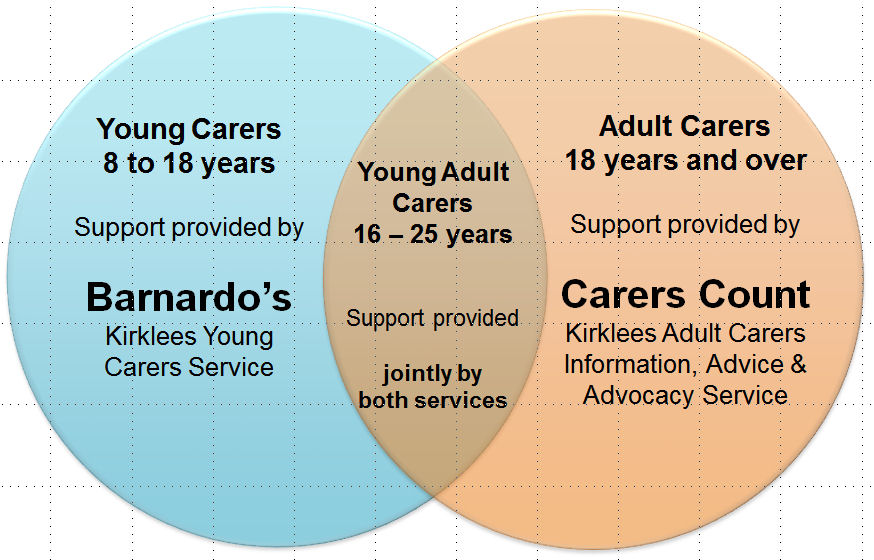
Barnardo’s also support Young Adult Carers aged 16 – 18 at an important time in their lives as they approach adulthood. They need to think about higher education, leaving home and starting work and addressing barriers which can prevent them achieving their lifetime potential. This new approach is in partnership with Carers Count. Carers Count website
An annual young carer’s conference is offered to students and staff from all Kirklees schools. This provides opportunities for young carers to get together, promote the carers service which identifies future local needs and hidden carers.
PCAN – (Parents of Children with Additional Needs). An independent, parent-led forum for parents and carers of children and young people with additional needs aged from birth to 25 years. Telephone 07754 102336. www.pcankirklees.org
KIAS – (Kirklees SEND Information, Advice and Support Service). A statutory, free, unbiased and confidential service, for parents and carers, children and young people. Telephone 01484 225 422. www.kias.org.uk
Adult Carers – Carers Count is the Kirklees Adult Carers Information, Advice and Advocacy Serviced for adult carers caring for someone aged 18 years and over. (See Adult Carer JSA link)
Kirklees Local Offer – web based information for families of children and young people aged 0-25 with special educational needs and disabilities. www.kirkleeslocaloffer.org.uk
Views of Local People
Messages from Young Carers and Parent carers consistently ask for more support for the person they care for and continuity of a key worker so people don’t need to go through the same things again and again. Locally and nationally, carers experience disadvantage and lack of equality. Some of the challenges faced can be addressed locally, while some national issues need longer term strategic direction.
As part of engagement work recently carried out with Kirklees Young carers and Young Adult Carers (11) they told us the following:
- Involve us in planning and delivering services and activities.
- Have the right adults working with us (people we can trust, who we can talk to in confidence, who are not judgemental, who like young people).
- Support our parents, carers, siblings and friends so they can support us.
- Provide young people friendly settings.
- Because of transport issues, we need local venues.
- We want to know what we can expect from a service (provide us with information we need, let us know who can help and where we can go for help when we need it).
- Give us choices; let us use our own coping and resilience skills.
- Offer us help when we are struggling.
Within the development of a Kirklees Carers Strategy (7), Parent Carers said they would like access to:
- an advocacy service
- support for parent carers for children who don’t meet the criteria to access Disabled Children’s service and or while awaiting an assessment
- training for carers and employed personal assistant helpers
- counselling for parent carers around grief, loss, lifelong commitment
- sufficient support for vulnerable cared for people to reduce pressure on carers
- GPs who have better recognition of needs of young people with emotional / behavioural issues
- more financial and emotional support
What could commissioners and service planners consider?
Commissioners, service planners and Councillors should consider local community assets such as those outlined above so that they can support and build on local strengths and also understand where there are gaps and unmet needs in particular places or amongst particular communities.
Research by Manchester Metropolitan University highlighted that for every pound invested in young carer’s services, the saving to the Exchequer and wider society is £6.72 (12).
In April 2014, the Children and Families Act 2014 and the Care Act 2014, came into effect. These Acts included new rights for young carers and their families to an assessment of support needs and transition assessment for young carers and young adult carers as they progress into adulthood (13,14).
The legislation expects local authority services to work with partner agencies and adopt ‘Whole Families Approach’s’ with families across all age groups as part of their care assessments and support. Any young people aged 5 to 9 years undertaking caring roles need to be addressed in the whole family assessment of the cared for person.
Locally we need to develop collaborative and working together opportunities under a memorandum of understanding as recommended by NHS England (15) which develop integrated approaches to identifying and assessing Carer health and wellbeing between adult and young people’s services. This needs to consider early intervention and prevention approaches and engagement with excluded and vulnerable groups. Services should reflect the diversity amongst carers; recognise caring across the life-course and work together to enable families to remain resilient when caring affects them.
This should involve Children’s and Adult’s social care, NHS Commissioners, Clinical Commissioning Groups and service providers including third sector organisations by developing integrated approaches in identification, assessment and support of carers and families (15) , which:
- Maintains the independence, physical health and emotional wellbeing of Carers and their families and reduces their reliance on support from services.
- Empowers and supports Carers to manage their caring roles and have a life outside of caring.
- Ensures Carers receive the right support, at the right time, in the right place.
Respects a Carer’s decision about how much care they will provide and respect the Carer’s decision about not providing care at all.
References
- Becker F, Becker S. Young adult carers in the UK: Experiences, needs and services for carers aged 16-24. Benefits. London; 2008.
- Office for National Statistics. Census data. 2011. Available from: https://www.ons.gov.uk/census/2011census/2011censusdata
- Kirklees Council. Children and Young People’s Survey 2014. 2014.
- The Children’s Society. Hidden from view: The experiences of Young Carers in England. 2013.
- Carers UK. The State of Caring. 2013. Available from: https://www.carersuk.org/for-professionals/policy/policy-library/the-state-of-caring-2013
- NHS Kirklees, Kirklees Council. Current Living in Kirklees Survey. 2012.
- Kirklees Council. Kirklees Carers Strategy Update. 2015.
- Public Health England. National Child and Maternal Health Intelligence Network. 2016. Available from: http://www.chimat.org.uk/default.aspx
- Sandwich Caring – Carers UK. Available from: http://www.carersuk.org/for-professionals/policy/policy-library/sandwich-caring
- ADASS, ADCS, The Children’s Society. Working Together to Support Young Carers and their Families: A Template for a Local Memorandum of Understanding [MoU] between Statutory Directors for Children’s Services and Adult Social Services. 2012.
- Kirklees Council. Young Carers: What we already know – Key messages about services for young people. 2015.
- Crossroads Caring for Carers, The Princess Royal Trust for Carers. Economic Evaluation of Young Carers ’ Interventions Crossroads Caring for Carers and the Princess Royal Trust for Carers. 2008.
- Department of Health. The Care Act and whole-family approaches. 2015.
- Department of Health. Statutory guidance to support local authorities implement the Care Act 2014. 2016. Available from: https://www.gov.uk/guidance/care-and-support-statutory-guidance
- NHS England. An integrated approach to identifying and assessing Carer health and wellbeing. 2016.
Date this section was last reviewed
22/08/16
